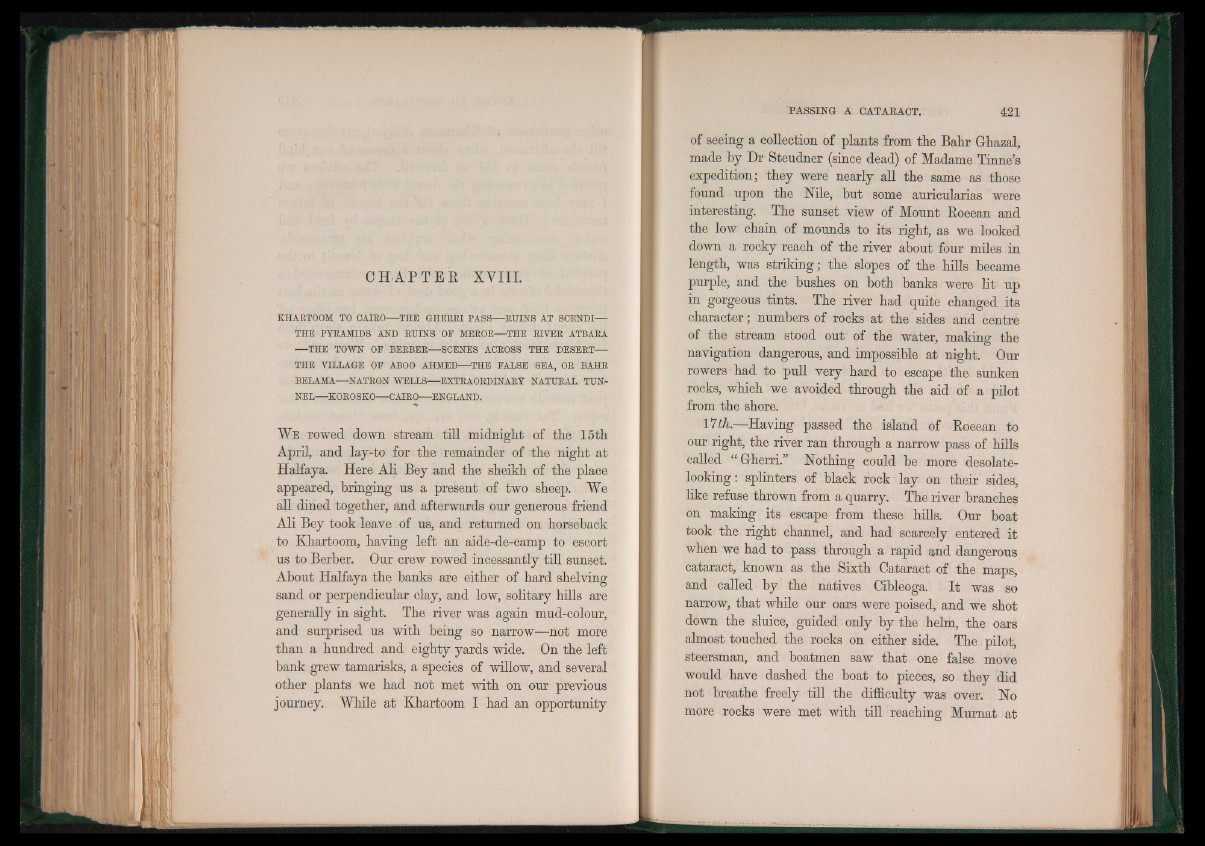
C H A P T E R XVIII.
KHARTOOM TO CAIRO— THE GHERRI PASS— RUIHS AT SCENDI—
THE PYRAMIDS AND RUINS OE MEROE— THE RIVER ATBARA
—'■THE TOWN OE BERBER— SCENES ACROSS THE DESERT—
THE VILLAGE OE ABOO AHMED— THE FALSE SEA, OR BAHR
BELAMA— NATRON WELLS— EXTRAORDINARY NATURAL TUNNEL—
KOROSKO— CAIRO— ENGLAND.
W e rowed down stream till midnight of the 15th
April, and lay-to for the remainder of the night at
Halfaya Here Ali Bey and the sheikh of the place
appeared, bringing us a present of two sheep. We
all dined together, and afterwards our generous friend
Ali Bey took leave of us, and returned on horseback
to Khartoom, having left an aide-de-camp to escort
us to Berber. Our crew rowed incessantly till sunset.
About Halfaya the banks are either of hard shelving
sand or perpendicular clay, and low, solitary hills are
generally in sight. The river was again mud-colour,
and surprised us with being so narrow—not more
than a hundred and eighty yards wide. On the left
bank grew tamarisks, a species of willow, and several
other plants we had not met with on our previous
journey. While at Khartoom I had an opportunity
of seeing a collection of plants from the Bahr G-hazal,
made by Dr Steudner (since dead) of Madame Tinne’s
expedition; they were nearly all the same as those
found upon the Nile, but some auricularias were
interesting. The sunset view of Mount Roeean and
the low chain of mounds to its right, as we looked
down a rocky reach of the river about four miles in
length, was striking; the slopes of the hills became
purple, and the bushes on both banks were lit up
in gorgeous tints. The river had quite changed its
character; numbers of rocks at the sides and centre
of the stream stood out of the water, -making the
navigation dangerous, and impossible at night. Our
rowers had to pull very hard to escape the sunken
rocks, which we avoided through the aid of a pilot
from the shore.
17th.—Having passed the island of Roeean to
our right, the river ran through a narrow pass of hills
called “ G-herri.” Nothing could be more desolate-
looking: splinters of black rock lay on their sides,
like refuse thrown from a quarry. The river branches
on making its escape from these hills. Our boat
took the right channel, and had scarcely entered it
when we had to pass through a rapid and dangerous
cataract, known as the Sixth Cataract of the maps,
and called by the natives Cibleoga. It was so
narrow, that while our oars were poised, and we shot
down the sluice, guided only by the helm, the oars
almost touched the rocks on either side. The pilot,
steersman, and boatmen saw that one false move
would have dashed the boat to pieces, so they did
not breathe freely till the difficulty was over. No
more rocks were met with till reaching Mumat at